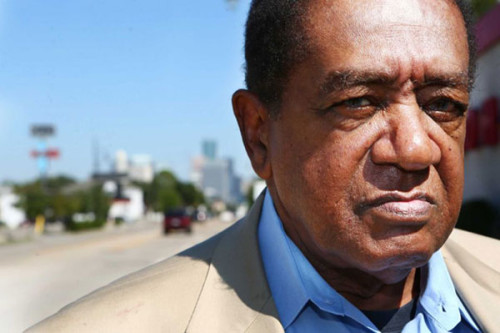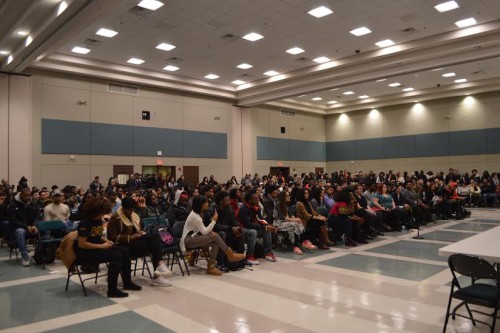 “Power to the people is still what it’s all about,” said legendary civil rights leader and Black Panther Party co-founder Bobby Seale at SUNY Old Westbury on February 16th. The power of organized activism and need for young people to build on the efforts of their predecessors were the central themes of his talk before over 400 students, faculty, and staff.
“Power to the people is still what it’s all about,” said legendary civil rights leader and Black Panther Party co-founder Bobby Seale at SUNY Old Westbury on February 16th. The power of organized activism and need for young people to build on the efforts of their predecessors were the central themes of his talk before over 400 students, faculty, and staff.
Seale discussed the earliest public tactics the party used to raise its profile, most notably their monitoring of police activity in and around Oakland, California. “The goal was to capture the imagination of the people,” Seale said.“If you can capture the imagination of the people, then you can organize them.”
For nearly 90 minutes, Seale recounted his life from his upbringing in Northern California, to his professional career in community development, and his work as a leader in the creation of the Black Panther Party, the revolutionary activist organization seeking equal rights, support and opportunities for African-Americans from its founding in 1966 until 1982.
In recounting his work to create the party with fellow co-founder Huey Newton, Seale focused emphatically on their intent to raise interest and understanding of the rights, needs, and contributions of African-Americans both across the nation’s history and in contemporary society. Further, he said, the goal was to activate African-Americans to realize the need for more members of their community to run for political office and support those who did.
Seale noted that detractors of the Black Panther Party at the time and throughout history have decried the arming of some party members with rifles and handguns and wrongfully portrayed the party as a violent organization. He said that he and his colleagues were always well-versed in their rights and the law, including those related to firearm possession and use. “We didn’t want to be violent, but we wanted people to know that, if you attack me, I’m going to hit back.” Citing the party’s critics, he specifically cited a reference by then director of the FBI J. Edgar Hoover who warned that the Black Panther’s free breakfast programs for underprivileged school children was a threat to national security.
The lecture also included discussion of other activities of what he described as the Black Panther Party’s “human liberation movement,” including the breakfast programs, free health clinics, and among the earliest sickle cell anemia testing programs for African-Americans in the United States.
Seale Specifically urged allies into running for public office at all levels, “What I had discussed with Huey Newton and others, that we have to have to some political electoral community power to take over the seats. This is what I discussed a year before creating the Black Panther Party.”
Seale began his work while at Merritt Community College in Oakland, studying engineering and politics, where he became a part of the Afro-American Association. This is also where he met Black Panther Party co-founder Newton. Several years later he worked at an anti-poverty center, specifically teaching younger generations Black history.
Influenced by Malcom X, the year after his assassination, the Black Panther Party for Self-Defense was created along with its Ten-Point Program. This was the party’s platform and read as the party’s bill of rights, which included the right to full employment, and freedom to determine one’s destiny, education and housing.
Along with discussing his history of activism across the past fifty years, Seale looked to the future, noting his intent to create a not-for-profit organization focused on what he described as an “environmental renovation and youth jobs program.”
In closing, Seale referred to the famous call of Black Panther Party–”Power to the People”–while imploring the students in attendance to be organized and active. “You must get your education, and make sure your ideas, beliefs, and actions always correspond to reality,” he said.
Politics, Economics and Law Club President Steve Abreu helped introduce the octogenarian activist.
The event was sponsored by the PEL Club and co-sponsored by the PRIDE Club, Mu Sigma Upsilon Sorority, Inc., and MALIK Fraternity, Inc.

Image from Ariel Zuniga
![Bobby Seale autographing books, posters, and more [Image from Ariel Zuniga]](https://www.oldwestburycatalyst.org/wp-content/uploads/bobby-seale-500x333.jpg)
Bobby Seale autographing books, posters, and more
[Image from Ariel Zuniga]
